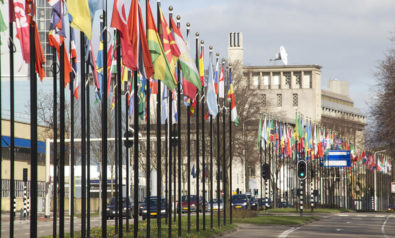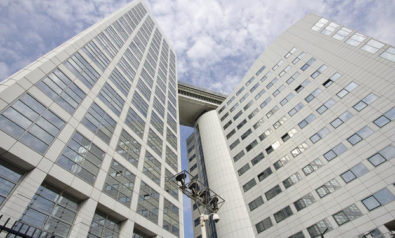Local tribunals require media attention if they are to be alternatives to the ICC.
Kenya’s president, Uhuru Muigai Kenyatta, and his deputy, William Samoei Ruto, face charges for crimes against humanity at the International Criminal Court (ICC). They stand accused of orchestrating the violence that followed the 2007 general elections in Kenya. As a result of the violence, at least 1,200 people were killed with hundreds of thousands injured and displaced from their homes.
To date, many of the victims’ families still yearn for justice and repatriation. Despite initial promises to cooperate with the ICC in proving their innocence, the Kenyan leaders are now intent on evading the dock for as long as they can.
Leading figures from other African countries have backed Kenya’s petition to postpone the cases against Kenyatta and Ruto, claiming that the proceedings were interfering with their role as heads of state. Kenyatta and Ruto argue that they were democratically elected in 2012 and a move by the ICC to bar them from executing their duty to the electorate infringes upon Kenya’s sovereignty. Notwithstanding is the claim that the ICC targets African leaders who are at a weaker bargaining position, given their states’ dependence on the West for economic support.
Local Justice as an Alternative
As a result of these grievances, the indictments against the Kenyan leaders have become an African Union (AU) affair. The AU requested for the cases against Kenyatta and Ruto to be deferred. The union also called for amendments to the Rome Statute, including the establishment of a court in Africa whose mandate would be to try alleged perpetrators of crimes deemed to be internationally significant.
However, given the history of local tribunals in Africa, a move to establish an “African court” will only further shield the continent’s leaders from international accountability. Such a move will only facilitate impunity and iron fist leadership that have characterized post-colonial African countries.
The international community, beginning with South Africa, developed the concept of local tribunals to try individuals who were not summoned by the ICC. Despite their foreign origin, local tribunals perpetuate the idea of homegrown justice, which is crucial to restoring faith with host countries’ judicial processes.
Setting up these criminal tribunals and introducing national trials or truth and reconciliation commissions have become a common feature of the international community’s response to war crimes and crimes against humanity. However, a lack of oversight on these tribunals has resulted in slow, stalled, and flawed processes.
An Independent Watchdog in Rwanda and Sierra Leone
However favorable the idea of localized justice seems, press coverage of these events leave a lot to be desired. The United Nation’s International Criminal Tribunal for Rwanda (ICTR), which is based in Arusha, Tanzania, presents an ideal case. The tribunal’s mismanagement, geographical isolation, and general slowness has only heightened its problems.
Given Western media’s knack for sensational African news, this apparently uninteresting tribunal has seen little or no press coverage. As a result, a new initiative was launched: To fill the information gap, international NGOs have assumed the role of independent media companies. Three of them — whose headquarters are located in the US (Internews), Switzerland (Fondation Hirondelle), and France (Intermedia) — have provided coverage of the ICTR since the trials began in 1997.
Since 2003, however, Fondation Hirondelle has been the only international NGO that still operates on a daily basis in Arusha, while Internews has moved to Kigali. This eventual disengagement of the “watchdogs” is a common trend among the international community with their judicial oversight in Africa.
Sierra Leone provides a slightly different case. Unlike the ICTR, which has seen coverage by international NGOs, the Special Court for Sierra Leone, whose trials began in 2004, is only covered on a permanent basis by local media. No information-focused NGO like the one in Arusha has started a project in Freetown relating to the court’s activities.
The local press in Sierra Leone suffers from grave economic and ethical problems, while also having a lack of journalists trained in court reporting. As a result, the Special Court for Sierra Leone — which is primarily funded by the US, the Netherlands, Britain, and Canada — lacks any independent international watchdog. The only international NGO currently involved in monitoring the Special Court is the International Center for Transitional Justice. Unfortunately, the center does not aim at providing a public and independent journalistic coverage of the trials. Therefore, it cannot replace the press as a watchdog.
Lessons for the Kenyan Case and the Future
Such situations — ones in which NGOs are responsible for reporting on trials with a highly political agenda — raises questions over NGO independence and the role they play as a watchdog. NGO reporting lacks investigative, analytical, and critical approaches. Their editorial policy is often driven by a “project” mentality — common to NGOs — rather than a journalistic one.
In Sierra Leone, a lack of independent and professional media organizations has resulted in a loss of democratic control over the judicial process.
Based on Rwanda and Sierra Leone, it is clear that the judicial process can be authoritarian, corrupt, and dysfunctional once there is a lack of accountability. One can only conclude that this lack of transparency in local tribunals has informed the decision by Kenyatta and Ruto to advocate for an “independent” local tribunal, as opposed to going to The Hague for their role in the 2007-2008 post-election violence.
Although requests to defer the Kenyan cases were denied, the petition for the establishment of an African court is still on the table for discussion by the Assembly of State Parties (ASP). While Kenyatta and Ruto will not benefit from the decision by the ASP on the various proposed amendments, the future of Africa’s accountability to international law is at stake.
Opinion polls show an increasing consensus among Kenyans that their leaders should face the ICC and prove their innocence — perhaps a signal of distrust in alternative judicial systems.
The potential effectiveness of African judicial institutions should not be questioned, as long as local tribunals are actually used for their intended manner.
In the absence of a counterbalancing legislative body — with state donors focused mainly on budgetary issues and with human rights organizations reluctant to criticize institutions they helped create — there is an obvious need for independent press scrutiny to hold these tribunals accountable. A fusion of independent international press and training of local journalists is bound to help in achieving judicial transparency and accountability.
The views expressed in this article are the author’s own and do not necessarily reflect Fair Observer’s editorial policy.
Image: Copyright © Shutterstock. All Rights Reserved
Support Fair Observer
We rely on your support for our independence, diversity and quality.
For more than 10 years, Fair Observer has been free, fair and independent. No billionaire owns us, no advertisers control us. We are a reader-supported nonprofit. Unlike many other publications, we keep our content free for readers regardless of where they live or whether they can afford to pay. We have no paywalls and no ads.
In the post-truth era of fake news, echo chambers and filter bubbles, we publish a plurality of perspectives from around the world. Anyone can publish with us, but everyone goes through a rigorous editorial process. So, you get fact-checked, well-reasoned content instead of noise.
We publish 2,500+ voices from 90+ countries. We also conduct education and training programs
on subjects ranging from digital media and journalism to writing and critical thinking. This
doesn’t come cheap. Servers, editors, trainers and web developers cost
money.
Please consider supporting us on a regular basis as a recurring donor or a
sustaining member.
Will you support FO’s journalism?
We rely on your support for our independence, diversity and quality.







Comment